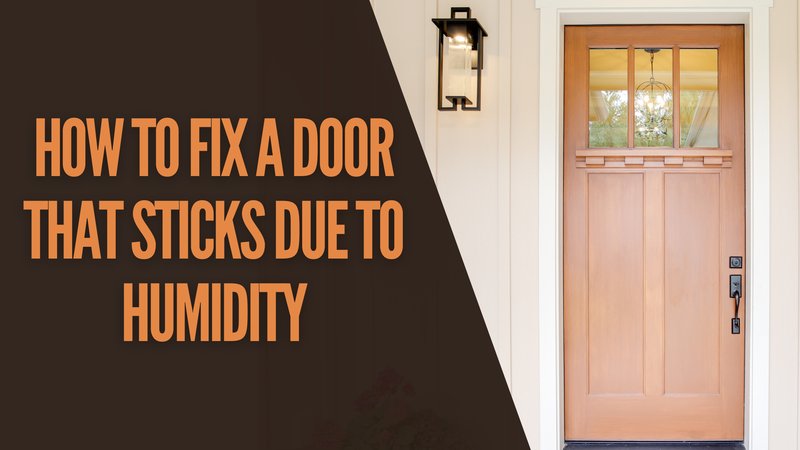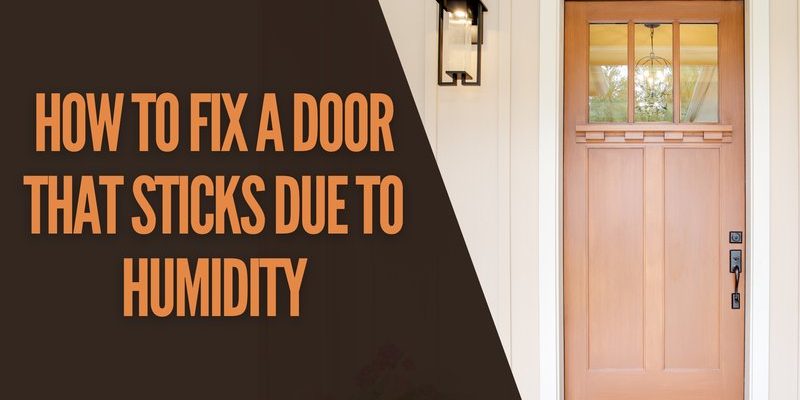
Understanding how moisture interacts with metal and wood can help you develop strategies to keep your door latches functioning smoothly. This guide will walk you through effective solutions, products that can help, and simple maintenance tips to prevent your door latches from sticking, even on the most humid days.
Why Do Door Latches Stick in Humid Weather?
When humidity levels rise, the moisture in the air can infiltrate the materials your door latch is made from, usually metal or wood. Let’s break this down a bit. Humidity causes materials to expand. If your door is wooden, it can swell, potentially misaligning the latch and making it stick. Metal components can also corrode or rust when exposed to excessive moisture over time, leading to increased friction when trying to operate the latch.
Another factor is dirt and grime combining with moisture, creating a sort of sticky sludge that can further hinder the operation of the latch. Think of it like trying to turn a doorknob that’s caked in mud—it just doesn’t work smoothly!
Regular Maintenance Can Go a Long Way
You might be wondering, “How do I prevent my door latch from sticking in the first place?” One of the best ways is consistent maintenance. This means checking your latches regularly for dirt or grime buildup. A simple wipe with a damp cloth can do wonders.
Additionally, consider applying a protective finish to wooden doors. Products like varnish or sealant can create a barrier against moisture. When it comes to metal latches, cleaning and lubricating the latch periodically can help keep it functional. Here’s a basic maintenance routine you can follow:
- Inspect the latch for any signs of rust or wear.
- Clean the latch with warm, soapy water and a cloth.
- Dry thoroughly to prevent moisture retention.
- Lubricate using a silicone spray or graphite powder for smoother operation.
Choosing the Right Lubricants
When it comes to lubrication, not all products are created equal. Oils can attract dirt and dust, making the problem worse in humid conditions. Instead, opt for dry lubricants like silicone sprays or Teflon-based products. These create a slick surface without leaving a sticky residue.
To apply the lubricant effectively, follow these steps:
1. Clean the latch as mentioned earlier.
2. Spray a small amount of the dry lubricant directly onto the latch mechanism.
3. Open and close the door multiple times to allow the lubricant to work into the mechanism.
4. Wipe off any excess that may have accumulated.
This simple change can dramatically improve your latch’s performance even in the stickiest of weather.
Considering Humidity-Resistant Materials
If you’re frequently battling sticking door latches, maybe it’s time to think about upgrading your hardware. Humidity-resistant materials like stainless steel or treated wood can stand up better to moisture, reducing the chances of sticking. Stainless steel is particularly good since it resists rust and corrosion.
When selecting new hardware, look for products specifically labeled for humid environments. They may cost a bit more upfront, but the longevity and reduced maintenance can save you headaches down the road.
Sealing Your Doors Against Moisture
Another effective strategy is to seal your doors. This isn’t just about aesthetics—proper sealing can help keep moisture from infiltrating your door materials. Use weather stripping or door sweeps to block out humid air. This can also improve energy efficiency in your home, keeping your space cooler and more comfortable.
When applying seals, ensure that they fit tightly without restricting the door’s operation. If you notice gaps, it’s time to replace worn-out seals promptly.
Keeping the Area Around Your Door Dry
Moisture doesn’t just come from the air; it can also come from the ground. If you have a porch, driveway, or garden near your door, ensure water isn’t pooling nearby. Overhanging plants or poor drainage can cause excess moisture to linger around your entryway.
A good solution is to create ways for water to drain away from the door area. Consider using gravel or paving stones to facilitate drainage or ensuring gutters direct rain away from the entrance.
Keeping your door latch from sticking in humid climates doesn’t have to be a constant battle. By implementing regular maintenance, choosing the right lubricants, upgrading materials, sealing your doors, and managing the surrounding environment, you can enjoy a smoother door experience year-round.
Remember, it’s often the simple steps that make the biggest difference. So whether you’re cleaning, lubricating, or making small upgrades, you’re investing in the convenience and comfort of your home. Now, go ahead and give your door latches the care they deserve!
